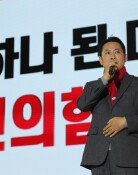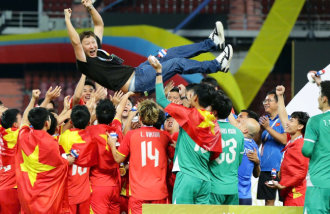Economy on the verge of freezing to death
Economy on the verge of freezing to death
Posted July. 24, 2013 05:35,
One hundred fifty days have passed since the inauguration of the Park Geun-hye administration. Has a sketch of the nations economic policy for the five-year term of the Park administration been drawn over the past five months? In her inaugural speech, President Park said, I will achieve economic revival and create the second Miracle of the Han River, in which the people are happy. Is the Republic of Korea currently moving in that direction? Is the economy growing to make revival, and is excitement to generate a miracle being restored? The reality is regrettable, however.
During her state visit to China last month, President Park visited Xi`an in Shaanxi province, about 1,200 kilometers from Beijing. She took a tour to Samsung Electronics semiconductor plant that is under construction in the city, a hub of Chinas western territory development. It is a mega plant that entails 8 trillion won (7.16 billion U.S. dollars) in total investment, and is set to create 20,000 jobs, including those with 160 companies that will have operations there.
In areas around the X`ian High-Tech Development District, banners reading Lets create a win-win situation in partnership with Samsung are flying at many locations. In a report in its July 15 issue, the Peoples Daily, Chinas flagship newspaper, displayed positive attention to the progress of the plant project by quoting a government official who lauded Samsung, saying, Samsung Electronics is extra cautious about safety ahead of the plants completion. The Chinese central government and provincial authorities have provided special and care-taken consideration to Samsung in terms of infrastructure and taxation to secure the tech giants investment.
In the wake of Chinese President Xi Jinpings visit to the U.S. last month, China proclaimed a new type of great power relationship. The worlds most populous country thus expressed its desire to stand on par with the U.S. in managing world order. It is a grand challenge that is even unthinkable without China`s GDP, the backing of its economic prowess, that is projected to surpass that of the U.S. Beijing provided ample assistance to attract Koreas top company in the great initiative to develop its western territories, which is mandatory for China for economic growth.
What would happen if economic growth halts in the Republic of Korea now? It will fall into a peripheral country that has little chance to revive and will find it more difficult to cope with North Koreas threat. The message People comes before the state sounds fabulous, but peoples happiness will only prove to be a blank promise if the country faces an economy wherein government debts and individual citizens debts only keep growing, without attaining economic growth. This is graphically demonstrated by countries in southern Europe on the brink of bankruptcies.
We should extend deep respect to people who make investment, President Park said on July 11, stressing anew the importance of deregulation. These people (corporate investors) truly revive the economy, create jobs, shore up consumption, and develop the nation. The government should do everything it can to ensure those investors face no inconvenience in conducting business activities and taking on new challenges. Her words per se are the best answer and solution.
The problem is the real situations in the field where policy is implemented. Even if the president makes such accurate remarks at all different meetings and wherever she goes, economic revival and the Miracle of the Han River can be empty slogans, unless words are put into practice. If the words are not translated into reality, the presidents glaring rhetoric will be deleted from the presidential office website every five years, and end up being nuisances in the cyber space.
To achieve economic revival, I will push to implement creative economy and economic democratization, President Park said in her inaugural speech. If creative economy is to blossom, economic democratization should be achieved. It is about time that the government reflects upon this. If the government truly wishes to benefit the future of the nation and people, it should seriously and meticulously reflects upon its economy policy.
Is economic democratization helping creative economy blossom? Are the spores of creative economy flying around, at a time when companies are taken aback in the face of economic democratization acts, tax inspections, the Fair Trade Commissions fines and threats to seek prosecutorial probes? Will people regain their stamina and vitality right away if they are put in cold water at 16 degrees Celsius and start to suffer hypothermia, before being invited to take a dip at warm sauna water 40 degrees Celsius? Enterprises are no different from people. If the healing of equity is tested through unconditional economic democratization drives without carefully examining the causes and results, will creative economy be achieved? As the government pressured conglomerates (masters) in a bid to help revive smaller companies (suppliers or servants), have the servants actually revived?
In the early days of a new administration, politics prevail and the power of policy-making gains strong momentum. In times like this, enterprises and the market will go low profile, even when politics and the power of policy-making minimize use of force. If the National Tax Service, prosecution, the Fair Trade Commission and the Board of Audit and Inspection brandish long swords, daggers, or awls at their disposal without reservation, enterprises will go into complete disarray, and money will go into hiding, and consumption will get frozen. It must be just a daydream to imagine economic revival and a miracle through an economy that is under the influence of a cold spell rather than warm sunshine. One might say that if a company did not commit any wrongdoings, it will have no reason to be afraid of. If there is any government official making this line of argument, he or she will be one of the following two cases: He or she is a self-righteous person who has no intention to know economy, enterprises or market, or a hypocritical master who gives no consideration to the servant in the first place.
What the government should be doing is not to recite and narrate the situation of a general crisis in the economy, but to take an action to transform the complicated situation of crisis into an opportunity. In order to elevate domestic economic temperature even by one or two degrees Celsius let alone creating a new Miracle of the Han River, it should revive entrepreneurship and encourage people with entrepreneurial spirit to take on challenges. A government that afflicts illness to them before presenting medicine is a bad one. If the cynicism of Lets all sink together continues to prevail and spread, the Korean economy is in truly grave danger.






![넘치는 전재수 과거 사진들…유죄의 증거일까, 무죄의 증거일까[청계천 옆 사진관]](https://dimg.donga.com/c/138/175/90/1/wps/NEWS/IMAGE/2025/12/20/132997378.1.jpg)
